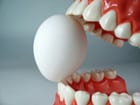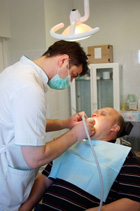 At some point in most of our lives we will have battled with bad breath. Whether it is the occasional bout following a meal of certain foods, or a more long running problem, everyone who has experienced it knows that it is very unpleasant and not something they would like to have repeated. The knowledge that your mouth is emitting unpleasant smells that your peers might notice is very damaging to self esteem and might leave you worried about social occasions.
At some point in most of our lives we will have battled with bad breath. Whether it is the occasional bout following a meal of certain foods, or a more long running problem, everyone who has experienced it knows that it is very unpleasant and not something they would like to have repeated. The knowledge that your mouth is emitting unpleasant smells that your peers might notice is very damaging to self esteem and might leave you worried about social occasions.
So what can you do about it? Knowledge is power and, as such, you need to try and understand why bad breath is happening in the first place. Known as halitosis by medical experts, bad breath is basically caused by a certain type of bacteria which can occur in the mouth. Certain foods are more likely to produce these bacteria and you should get to know which ones are doing it to you.
Brushing your teeth then is not just about cleaning your teeth to remove plaque. It is also about getting rid of the bad breath bacteria. We all know how much fresher our mouths feel after we have given our teeth a good brush and floss. But for some people it won’t be long until the bad breath is back. It could be that your mouth is rather dry and bad breath bacteria love dry mouths because they can ‘stick’ to the surfaces of your teeth with much greater ease. Try to keep your mouth moist by drinking water and chewing gum.
Central Leeds dentists know all about bad breath and they will be able to help you beat it so that you can go about your life with confidence.





 Being able to conduct yourself properly in social situations is an important part of modern life when networking and business meetings are so crucial. We often can’t help making mistakes with the things we say, for example, but you can do something about a problem like bad breath. When you meet a stranger, the last thing you’ll want them to think about you is disgust at the way unpleasant smells are coming from your mouth. The key to dealing with a bead breath problem is to understand the causes and then act appropriately with the help of your Central Leeds dentist.
Being able to conduct yourself properly in social situations is an important part of modern life when networking and business meetings are so crucial. We often can’t help making mistakes with the things we say, for example, but you can do something about a problem like bad breath. When you meet a stranger, the last thing you’ll want them to think about you is disgust at the way unpleasant smells are coming from your mouth. The key to dealing with a bead breath problem is to understand the causes and then act appropriately with the help of your Central Leeds dentist. Oral hygiene isn`t a thing we can take lightly, a City ofl Leeds dentist explains. It is a necessary tool in war against premature tooth decay, which is caused mostly by a lax regime that allows the enemy to multiply. The enemy of your teeth is the bacteria that comes with our food, we can`t eliminate that in the food, but we can stop it feeding and producing harmful acid. Acid is the foremost reason for early tooth decay, and it is easily kept under control with a simple, but affective oral hygiene regime. This must be kept up during the day as well as in the morning and just before bedtime. Night time is when the saliva gland dries up and allows the acid to accumulate the most, therefore doing the most damage; saliva will act as an alkali to the acid and prevent it eating away at the tooth enamel. It is so important to keep this in mind when you are cleaning your teeth at night, first of all give your teeth a good flossing, get right in between those molars. Removing the food debris will starve the bacteria and prevent them not only producing acid, but also producing tartar which will be deposited onto your teeth. If I tell you that tartar is dead bacteria, then that should help you be more rigid in your dental oral cleaning regime. Next you will need to vigorously brush the teeth, again getting in between them and removing even more food build up, and finally a good rinse will remove whatever is left.
Oral hygiene isn`t a thing we can take lightly, a City ofl Leeds dentist explains. It is a necessary tool in war against premature tooth decay, which is caused mostly by a lax regime that allows the enemy to multiply. The enemy of your teeth is the bacteria that comes with our food, we can`t eliminate that in the food, but we can stop it feeding and producing harmful acid. Acid is the foremost reason for early tooth decay, and it is easily kept under control with a simple, but affective oral hygiene regime. This must be kept up during the day as well as in the morning and just before bedtime. Night time is when the saliva gland dries up and allows the acid to accumulate the most, therefore doing the most damage; saliva will act as an alkali to the acid and prevent it eating away at the tooth enamel. It is so important to keep this in mind when you are cleaning your teeth at night, first of all give your teeth a good flossing, get right in between those molars. Removing the food debris will starve the bacteria and prevent them not only producing acid, but also producing tartar which will be deposited onto your teeth. If I tell you that tartar is dead bacteria, then that should help you be more rigid in your dental oral cleaning regime. Next you will need to vigorously brush the teeth, again getting in between them and removing even more food build up, and finally a good rinse will remove whatever is left. Humans have made use of dentures for a very long time now, with people in ancient times using a variety of animal and human teeth to take the place of the ones they have lost. Thankfully, one does not have to go through all that trouble these days, and it is very easy for a person who has lost some or all teeth to get a replacement set from a dentist.
Humans have made use of dentures for a very long time now, with people in ancient times using a variety of animal and human teeth to take the place of the ones they have lost. Thankfully, one does not have to go through all that trouble these days, and it is very easy for a person who has lost some or all teeth to get a replacement set from a dentist. The purpose of brushing and flossing is to reduce the number of bacteria in the mouth that feed on food particles left over from eating. Bacteria feast on this food debris producing acids which cause damage to the enamel of the teeth, breaking it down and attacking the sensitive centre of the tooth. As if this wasn’t bad enough, bacteria and decaying food matter also cause over 90 per cent of cases of bad breath.
The purpose of brushing and flossing is to reduce the number of bacteria in the mouth that feed on food particles left over from eating. Bacteria feast on this food debris producing acids which cause damage to the enamel of the teeth, breaking it down and attacking the sensitive centre of the tooth. As if this wasn’t bad enough, bacteria and decaying food matter also cause over 90 per cent of cases of bad breath. There are over 350 types of bacteria found in the average human mouth but many of these have no real harmful effects. However, about 5 per cent of these bacteria are responsible for causing gum disease if not removed by brushing and flossing.
There are over 350 types of bacteria found in the average human mouth but many of these have no real harmful effects. However, about 5 per cent of these bacteria are responsible for causing gum disease if not removed by brushing and flossing. When it comes to personal hygiene, without question one of the most common and unpleasant qualities is bad breath. Having breath that smells can be very unpleasant for others and make you significantly less attractive to the opposite sex. What most people don’t realise however, is that in over 90 per cent of cases, bad breath is caused by poor standards of oral hygiene and easily treated.
When it comes to personal hygiene, without question one of the most common and unpleasant qualities is bad breath. Having breath that smells can be very unpleasant for others and make you significantly less attractive to the opposite sex. What most people don’t realise however, is that in over 90 per cent of cases, bad breath is caused by poor standards of oral hygiene and easily treated.

